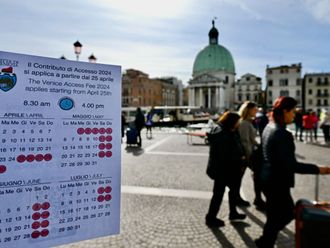
Madrid: Airbnb Inc wants a truce with Barcelona.
The home-sharing platform plans to limit the number of home rentals for tourists in central Barcelona, while separating professional landlords from regular users amid a backlash from local authorities concerned about mass tourism. The latest proposal follows similar steps announced in other tourist destinations like London and Amsterdam as the company responds to unease in European cities over the boom in informal accommodation services.
At stake for Airbnb is the future of its listings business in Barcelona, a city with 1.7 million inhabitants that lured more than 8 million foreign tourists in 2016 to visit sights such as the Sagrada Familia church and the Camp Nou soccer stadium. For the city itself, its disputes with Airbnb and other rental platforms are part of a wider challenge to balance the economic benefits of mass tourism with preserving its character and quality of life.
“We don’t want Barcelona turning into a theme park where neighbours are priced out of their homes and local businesses come under pressure,” Janet Sanz, a deputy mayor in charge of urban planning issues at Barcelona council, said by phone. “We want to make tourism compatible with the way of life of the people of Barcelona.”
Under the new guidelines, Airbnb will limit the number of home rentals to one property in the central Barcelona area of Ciutat Vella unless the listing is run by a professional, in which case they will be required to provide business information on its website starting April. Airbnb said it has held meetings with local authorities in recent weeks and presented the plan to both city hall and regional officials earlier Tuesday. At the Centre of the matter are concerns about mass tourist arrivals and the long-term impact on housing availability.
Airbnb’s business in the city has almost doubled in two years, rising to 20,000 listings from 11,000 in 2014. Barcelona is now the fourth-biggest city for Airbnb rentals in Europe behind Paris, London and Rome and the ninth-biggest in the world. As many as 900,000 people used Airbnb to arrange accommodation in Barcelona in 2015, according to the company.
Stirring tensions
The platform’s growth in Barcelona mirrors its booming business around the world, stirring tensions with civic authorities. Cities including New York have criticised Airbnb for becoming a platform for unregulated hotels while Paris officials have said they’re worried about meeting housing needs as some neighbourhoods are swamped by tourists.
Airbnb has argued its business has a positive influence and has repeatedly said it wants to talk with regulators and well-established rivals. “Airbnb is part of the solution in Barcelona,” said Arnaldo Munoz, general manager of marketing services for Airbnb in Spain and Portugal. “We want to be good partners, and work together on clear and simple home-sharing rules.”
Even so, its rapid growth has aggravated city authorities who slapped a €600,000 ($644,160; Dh2.37 million) fine on Airbnb in November for advertising what they deemed to be illegal room rentals. Barcelona accused the company of posting 3,812 unlicensed rentals, a practice the city’s Mayor Ada Colau described as intolerable. Airbnb said it would appeal the fine.
New Venice
The government of Catalonia, the region that encompasses Barcelona, also intends to make Airbnb hosts sign up for an official register before placing an advert on the site, a spokesman said. It will also set limits on the number of guests allowed per property.
There may be as many as 7,000 tourist apartments in Barcelona operating without a licence, said Sanz. “We don’t want Barcelona turning into a new Venice,” she said.
The tensions surfacing in Barcelona are also being felt across Spain’s tourism industry, Europe’s second-biggest after France, that lured 76 million foreign visitors last year.
A 2015 study commissioned by the industry lobby Exceltur estimated the number of accommodation places available on online platforms such as Airbnb at 2.7 million compared with 2.4 million regulated places in establishments such as hotels.
Tax revenue
The amount of tax revenue lost because of online lodging platforms could be as high as €800 million a year, the study by EY, Tourism & Law and Nielsen said. Airbnb counters by saying its room hosts are not industry professionals and that 70 per cent of its listings are rented for less than 90 days a year.
The company also says Barcelona benefits economically from its business. A typical host in the city earns €5,000 a year by renting his or her property for 58 nights a year, according to Airbnb.
Meanwhile, Barcelona residents say they’re also suffering from the tourism boom, fuelled in part by the growth of online rentals, as they grapple with noisy tourist hordes and pressure on real estate prices and public services.
“This is a real issue — we’re being priced out of the market and kicked out of our neighbourhoods,” said Joan Balanac, 65, vice-chairman of the Confederation of Barcelona Neighborhood Associations, who lives near the Sagrada Familia, the landmark basilica designed by Antoni Gaudi. “The noise and crowds are out of control to the point where I can’t even get on the metro. This isn’t the city I grew up in.”












